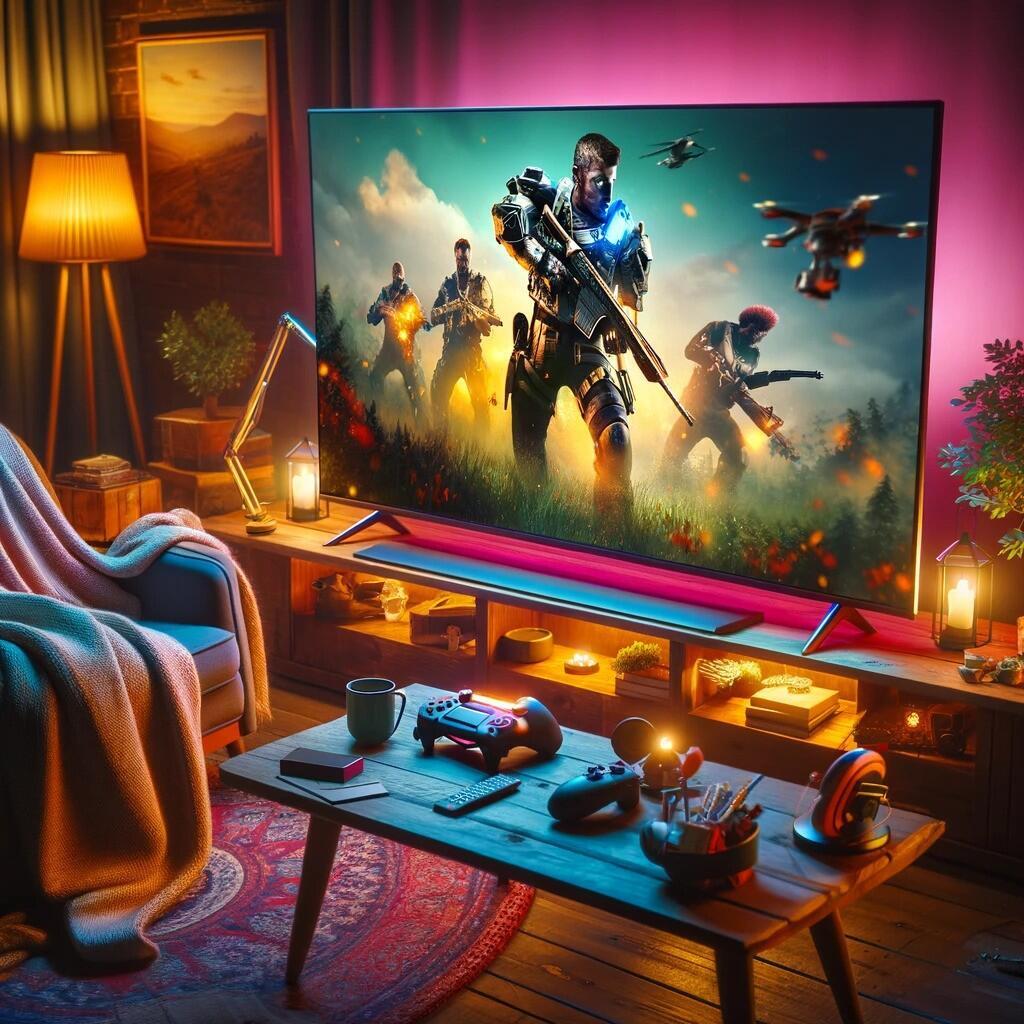
Can You Use a TV as a Computer Monitor for Gaming?
Can You Use a TV as a Computer Monitor for Gaming?
In the search for the ultimate gaming setup, game lovers often think about the possibility of using a TV as a computer monitor. The attraction to larger screens is understandable, as they offer a more immersive experience. The concept of having a display that serves the dual purpose of gaming and entertainment is also quite appealing.
But is a TV truly up to the task, and what challenges might gamers face in pursuit of that expansive display?
Key Considerations Before Using a TV as a Monitor
Before using your living room TV as a monitor, several factors should be taken into consideration:
Resolution and Size
The clarity of your game's visuals depends on resolution. Modern TVs often boast 4K resolution, offering crisp images even on larger screens. However, ensure your gaming rig can handle the higher resolution without compromising performance.
Additionally, consider the size of the TV; larger screens may require frequent head-turning to fully view the game scene, which can detract from the gaming experience.
Refresh Rate and Response Time
The refresh rate, indicating how many times the screen updates per second, is important in fast-paced games. While some high-end TVs match the 120Hz refresh rate of gaming monitors, many are still at 60Hz, which may not be enough for competitive gaming. Response time, or how quickly a pixel can change color, also tends to be slower on TVs, potentially leading to motion blur.
Input Lag
Input lag is the delay between executing an action and seeing the result on-screen. It can make or break a gaming experience. TVs generally have higher input lag than dedicated gaming monitors, though many now offer a 'Game Mode' to reduce it. Still, for twitch-sensitive games, even a slight delay can be frustrating.
Advantages of Using a TV as a Monitor
Despite these considerations, using a TV as a gaming monitor has its perks:
Screen Size
The large size of of TV screen offers a more immersive gaming experience than a small monitor.
Cost-Effectiveness
If you are on a budget and can’t afford a large-sized monitor, a TV can be a more affordable option than a high-end gaming monitor, especially when considering the size-to-price ratio.
Versatility
A TV's multipurpose use from gaming to streaming movies offers convenience and value, allowing you to maximize your living space for both entertainment and gaming.
Challenges and Solutions
Using a TV as your gaming monitor can present unique challenges but with the right approach, these can be converted into opportunities for an enhanced gaming experience.
Desk Space and Viewing Distance
A larger TV requires more desk space, and sitting too close can strain your eyes and make it difficult to capture the entire field of view in fast-moving games.
Consider mounting the TV on the wall to save desk space and maintain an optimal viewing distance. Ergonomic experts suggest sitting at least as many inches away from the screen as its diagonal measurement. For example, for a 55-inch TV, aim to sit at least 55 inches away.
Fine-Tuning Settings for Gaming
TVs are primarily designed for watching movies and TV shows. Their default settings might not be ideal for gaming which can cause issues like motion blur or unnatural colors.
It is therefore important to activate 'Game Mode' if available, which is designed to reduce input lag by minimizing processing delays.
Adjust picture settings by lowering the sharpness to reduce artificial edge enhancement. Set the color temperature to 'Warm' for more natural tones. Manually adjust brightness and contrast to avoid washed-out or overly dark scenes.
Connectivity and Ports
It can be difficult to connect your gaming PC to your TV if it lacks the necessary ports, especially considering the need for high-speed connections for 4K gaming.
You can check for HDMI 2.1 Ports as these are essential for 4K gaming at 60Hz or higher. If your TV only has HDMI 2.0, you'll be limited to 4K at 60Hz or might need to step down to 1440p or 1080p for higher refresh rates.
You can also consider Adapters or Converters. If your PC's output doesn't match the TV's input, high-quality adapters can bridge the gap without significantly impacting performance.
By addressing these challenges with informed solutions, gamers can enjoy the benefits of a large, vibrant display without compromising on the quality of their gaming experience. Whether it's adjusting settings, rethinking your setup, or understanding the nuances of your TV's technology, a little effort can go a long way in optimizing your gaming adventures with a TV as your monitor.
Understanding OLED Technology in TVs and Monitors
With OLED (Organic Light-Emitting Diode) technology becoming more prevalent in TVs and monitors, it's worth considering for gaming. OLED monitors offer superior contrast ratios, perfect blacks, and vibrant colors, significantly enhancing visual immersion. However, they come with considerations:
Burn-in Risk: OLED screens can suffer from burn-in, where static images leave permanent ghostly imprints. For gamers, this means HUD elements could become etched onto the screen over time.
Cost: OLED technology typically commands a premium, making it a pricier option for gamers.
Mitigation: Reduce burn-in risk by using screen savers, dimming the HUD in games, and varying content to avoid prolonged static displays.
Tips for Multi-Use Setups
When considering a TV as a computer monitor for gaming, many users aim for a setup that effortlessly transitions between high-octane gaming sessions and relaxed movie nights. Achieving this dual functionality without constantly fiddling with settings requires a bit of planning and some smart solutions.
Switching Between Gaming and TV Viewing
The key to a smooth transition lies in understanding your TV's capabilities and setting up easy-to-switch profiles if available. Many modern TVs allow you to save specific settings profiles; use this feature to create one optimized for gaming (with 'Game Mode' on, motion smoothing off, etc.) and another for standard TV viewing. If your TV lacks this feature, note down your preferred settings for each activity for quick manual adjustments.
Sound Solutions
Audio plays an important role in both gaming and entertainment experiences. While gaming might demand precise, directional sound to pinpoint in-game actions, watching a movie might benefit from a more balanced, surround sound setup. Consider investing in a soundbar or speaker system that offers customizable profiles or modes designed for different content types. This way, you can switch audio settings to match your activity with the push of a button.
Cable Management and Input Switching
A multi-use setup often means more devices and potentially more cable clutter. Employ cable management solutions like sleeves or channels to keep things tidy.
Additionally, consider a TV with multiple input ports to accommodate your PC, gaming consoles, and other media devices without needing to switch cables constantly. Using an HDMI switcher can further streamline the process, allowing you to change between devices with ease.
Remote and App Controls
Many TVs now come with smart remote controls or companion apps that offer extensive control over the TV's features. Familiarize yourself with these tools, as they can significantly simplify the process of adjusting settings, changing inputs, and even controlling other connected devices like sound systems or streaming sticks. Some apps also allow you to create custom button layouts, putting your most-used functions right at your fingertips.
Conclusion
Using a TV as a computer monitor for gaming is not only feasible but can also elevate your gaming experience with larger screens and vivid displays. While there are technical aspects to consider, such as input lag and refresh rates, the benefits of immersive gameplay and cost savings are compelling. With the right setup and settings adjustments, your TV can become a central piece of your gaming arsenal. Whether you're a casual gamer or a dedicated enthusiast, the expansive canvas of a TV screen offers a new dimension to your gaming adventures.
First published: 17:14, 04.04.24















